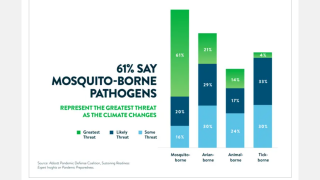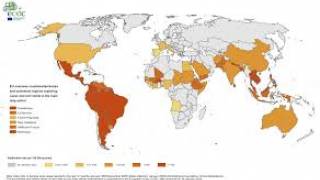Only One US Territory Reported Zika Cases in 2020

While the Zika virus epidemic is no longer headline news, one US Territory continues to report locally-acquired cases in 2020.
As of May 13, 2020, Puerto Rico has confirmed 8 locally-acquired Zika cases from mosquito-borne transmissions to the U.S. Centers for Disease Control and Prevention (CDC).
This new data is actually good news when compared with 2019 when Puerto Rico reported 70 locally-acquired Zika fever cases.
Zika cases in the U.S. territories are diagnosed using serologic testing, which detects antibodies against Zika.
Since antibodies against Zika can persist for years after infection, serology cannot distinguish between a recent or past infection, says the CDC.
And, sexually transmitted cases are not reported for US territories because it is not possible to determine whether infection occurred due to mosquito-borne or sexual transmission.
In the USA, most Zika cases are related to international travel, such as in Florida.
In 2019, 36 cases of Zika fever have been reported in individuals with travel history to a country or area experiencing Zika virus activity upon their return to Florida.
The countries of origin were: Brazil, Colombia (1), Cuba (6), Guatemala (5), Haiti (11), Honduras (4), Jamaica, Nicaragua, Philippines, Puerto Rico, and Venezuela (3).
The CDC says the decision to travel is personal and complex. In making this decision, consider your travel destination and your ability to protect yourself from mosquito bites.
However, the CDC recommends that pregnant women and couples planning a pregnancy within the next 3-months consult with a healthcare provider in making international travel decisions.
From a health risk perspective, data indicates about 1 in 20 (5%) of infants born by women with confirmed Zika virus infection during pregnancy in US territories had Zika-associated birth defects.
Moreover, birth defects were reported in a higher proportion of babies whose mothers were infected with Zika virus during the first 3-months of pregnancy.
As an example, a Zika virus infection during pregnancy is a cause of microcephaly.
Microcephaly is a birth defect in which a baby’s head is smaller than expected when compared to babies of the same sex and age. Babies with microcephaly often have smaller brains that might not have developed properly.
Babies who were infected with Zika before birth may have damage to their eyes and/or the part of their brain that is responsible for vision, which may affect their visual development.
If a baby was born with a congenital Zika infection, he or she should receive the recommended screenings and tests to check for eye and other health problems, even if the baby appears healthy.
A recent study in Brazil found that at 19-24 months, babies with congenital Zika virus infection exhibited challenges with sitting independently, feeding, and sleeping.
These babies also experienced seizures and hearing and vision problems, such as not responding to the sound of a rattle and not being able to follow a moving object with their eyes.
It is important to note that babies affected by the Zika virus will continue to require specialized care from many types of healthcare providers and caregivers as they age.
Not all babies born with congenital Zika infection will have all of these problems.
Some infants with congenital Zika virus infection who do not have microcephaly at birth may later experience slowed head growth and develop postnatal microcephaly, says the CDC.
From a prevention perspective, Zika vaccine clinical trials involving candidate DNA and purified inactivated virus vaccines showed they were well-tolerated in small studies and all induced neutralizing antibodies.
ZikaNews publishes microcephaly related news.
Our Trust Standards: Medical Advisory Committee

























